To: Commissioner Roxana Minzatou
From: Anna Diamantopoulou
Subject: Rebalancing Europe’s Strategic Agenda: Social Investment as the Foundation of European Security
Date: June 2025
⸻
1. Executive Summary
The EU faces a pivotal choice: whether to divert resources primarily to military and defence, or to protect and modernise the European welfare state — the foundation of our prosperity, cohesion, and democratic resilience. The dichotomy between welfare or warfare is false. Long-term competitiveness, social stability, and geopolitical security depend on sustained and transformative investment in our social systems.
Recent data underscore an alarming trend: child poverty is rising, and our population is rapidly ageing. A policy shift toward defence spending that sidelines the European Pillar of Social Rights, the Social Investment paradigm, and the European Social Semester will exacerbate inequality, fuel populism, and weaken Europe’s internal unity.
⸻
2. Key Challenges
a. Alarming Rise in Child Poverty
Despite political commitments, children at risk of poverty or social exclusion in the EU increased from 19.5% in 2021 to 24.8% in 2023, with only a marginal drop to 24.2% in 2024.
This trajectory threatens the core goals of the Pillar of Social Rights and violates the promise of intergenerational equity.
b. The Ageing Time Bomb
Europe’s older population is growing at an unprecedented rate:
• Population aged 75+: from 43.8 million (2020) to 75.4 million (2050)
• 65+ group: from 90.5 million (2019) to 129.8 million (2050)
• Growth of 75–84 age group: +56.1%
• Population under 55 projected to shrink by 13.5% by 2050.
Without major reform in social protection and care systems, the imbalance between working-age and dependent populations will strain public finances and deepen territorial and gender inequalities.
⸻
3. Strategic Priorities
A. Reinforce the European Pillar of Social Rights Action Plan
• Keep the 2030 targets on employment, poverty, and skills at the centre of EU economic governance.
• Ringfence funding for early childhood education, long-term care, and inclusive active labour market policies.
• Reintroduce robust social indicators in the European Semester, ensuring social priorities are not sidelined by fiscal discipline or defence spending.
B. Apply the “Social Investment” Logic of the Draghi Report
• The Draghi Report shows that welfare is a productive factor, not a fiscal burden.
• Social policy must enable transitions — digital, green, and demographic — through universal services and lifelong learning.
• Countries with strong welfare states (Nordics, Netherlands, Austria) have higher employment, stronger fiscal resilience, and lower populism.
C. Integrate the Diamantopoulou Report into EU Policy Cycles
• Propose that the Diamantopoulou Report on Social Protection feed into:
• Country-specific recommendations in the Semester
• Annual Sustainable Growth Strategy (ASGS)
• A dedicated Council discussion on Welfare State Reform 2035
• Key concepts to adopt:
• Life-course resilience
• Social buffers for unpredictable transitions
• Prevention of structural poverty cycles
⸻
4. Political and Democratic Stakes
• Scaling back welfare spending in favour of military expansion risks social fracture. The most vulnerable — especially children, low-income workers, and pensioners — will bear the cost.
• Rising poverty and inequality fuel far-right populism, weaken trust in institutions, and jeopardise the European project itself.
• Welfare is security. Protecting people against economic shocks is as critical to European stability as protecting borders.
“If we allow the welfare state to erode, we will not only lose our social cohesion — we risk losing our democracies.”
⸻
5. Recommendations
1. Call for an EU-wide “Social Resilience Test” for all major funding reorientations, especially in defence and security.
2. Launch a High-Level EU Task Force on the Future of the Welfare State, anchored in the Draghi and Diamantopoulou reports.
3. Ensure systematic tracking of child poverty and elderly care gaps within the Semester and Social Scoreboard.
4. Advocate for a permanent Social Investment Facility under the next MFF and/or a revised Recovery instrument.
⸻
6. Closing Message
Europe must not be driven by fear into militarisation at the expense of its core values. True strength lies not in choosing between welfare and warfare — but in recognising that inclusive prosperity and democratic resilience are the first lines of defence.
Let us reaffirm Europe’s social contract as the bedrock of both its internal legitimacy and external strength.

